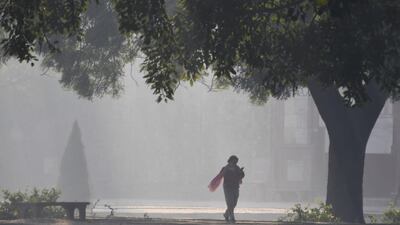Until Monday, when the Gujarat elections results came in, the air over Delhi was thick with speculation. The Indian capital, always a political cauldron, hissed and bubbled. Was Narendra Modi on the point of that ultimate indignity, losing face in his home state? Would Mr Modi’s BJP cede ground after 22 years in its stronghold? As it turned out, the BJP notched up its sixth straight win in Gujarat, albeit with a reduced margin. And the main opposition Congress party, led by Rahul Gandhi, put up a good fight and did rather better than before.
But politics may not be the most important story in India today. For, it is the air quality index that is really on the minds of Indians and visitors to the capital. That is entirely right and proper.
A permanent haze hangs over the Delhi sky, obscuring the sun. The wealthy and well-heeled employ multiple cordless AQI meters to assess when it’s safe to take a walk, sit on the terrace or air their richly-appointed houses. The poor wrap scarves around their noses as they walk, cycle or ride scooters and motorbikes on traffic-clogged streets. The marginally better-off sit miserably with their car windows rolled up in two-and-three-hour traffic jams, a twice-a-day occurrence everywhere.
This is the dystopian reality of life in one of the world’s great cities, which has been the capital of several empires and whose history goes back several thousand years.
But it’s not just Delhi that has a problem. The whole of India’s image is affected. In 2016, the World Health Organisation listed nine Indian cities among the world's 20 most polluted.
For all that it preens itself on being a rising power, India’s attractiveness as a destination for foreign investment, work, and play is being called into question. Even estimates the country will average growth rates of around 7.5 per cent over the next three years cannot lift the pall. Delhi is now the most polluted mega-city on earth, having supplanted Beijing. Last month, Indian doctors said breathing Delhi’s air is akin to smoking 50 cigarettes a day.
It has had a potent effect on multi-nationals, foreign embassies, NGOs and others. Their foreign staff, especially those with young families, expressed reluctance to be assigned to India. A US airline halted flights to Delhi and the UK government issued an advisory warning travellers "severe air pollution is a major hazard to public health”. Costa Rica’s ambassador left Delhi after developing respiratory problems. The Thai envoy asked Bangkok to re-designate Delhi a “hardship” posting, thus improving the perks for any diplomat unfortunate enough to be stationed there. The Dominican Republic’s ambassador officially expressed concern to the Indian government in his capacity as dean of Delhi’s diplomatic corps. Sections of the Indian media gloomily reported that some of the roughly 150 foreign missions in Delhi had moved nonessential staff to nearby countries such as Singapore.
______________________
Read more from Opinion
The Syrian regime has made many gains this year, but it is too early to tell whether it's game over
Vision 2021 sends a strong message to enhance skills and find local talent
The quest for a 'United States of Europe' exemplifies the EU elite's contempt for people's wishes
______________________
Meanwhile, for a cricket-mad nation, there was the humiliating sight of Sri Lankan athletes vomiting and struggling to breathe on the pitch during an international Test match in Delhi. It has led international sports bodies to ask if India is the right venue, especially in winter.
This is hugely damaging because it is the winter months that normally draw the largest number of foreign tourists to India. The tourism industry makes a significant contribution to the economy and is forecast to grow mightily by 2027.
But that cannot happen if toxic air poisons the otherwise sweet welcome offered by the Indian authorities. Mr Modi’s extensive travels to boost India's international profile and attract foreign investment will also come to nought if diplomats in Delhi write breathless cables to their capitals about the debilitating pollution crisis.
This is why the focus on political contests, such as in Gujarat, may ultimately prove no more than a distraction to India’s real predicament. Mr Modi’s government (and, to be fair, previous ones too) has been haphazard and half-hearted about dealing with the pollution problem. A combination of crop burning, construction dust and exhaust fumes intensifies the cocktail of dirty air in the cooler months.
And yet, the Indian government has done little over the past 20 years to offer a credible and consistent response. It is yet to help farmers find another way than burning to remove plant stubble from their fields. It has not really tamped down on rising vehicular traffic and runaway building activity in Delhi and other cities. Mobile app-run ride-hailing services such as Uber and Ola are doing a brisk business as Indians opt for the comfort of being driven to work relatively cheaply.
Mr Modi greeted the Gujarat election results with his usual self-congratulatory bombast. It was, he said, a vote for development. What sort of development may be the question on many lips.


